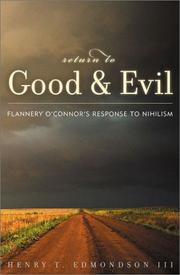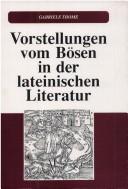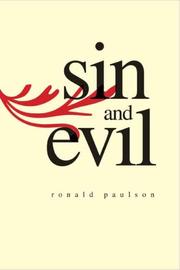| Listing 1 - 10 of 40 | << page >> |
Sort by
|
Book
ISBN: 1848880723 9004403485 Year: 2011 Publisher: Leiden; Boston : BRILL,
Abstract | Keywords | Export | Availability | Bookmark
 Loading...
Loading...Choose an application
- Reference Manager
- EndNote
- RefWorks (Direct export to RefWorks)
Good and evil in literature. --- Evil in literature --- Good in literature
Book
ISBN: 1283141884 1443826162 9786613141880 9781443826167 1443825875 9781443825870 9781283141888 6613141887 Year: 2011 Publisher: Newcastle upon Tyne Cambridge Scholars Pub.
Abstract | Keywords | Export | Availability | Bookmark
 Loading...
Loading...Choose an application
- Reference Manager
- EndNote
- RefWorks (Direct export to RefWorks)
Evil remains a primary source of inquiry in contemporary literature of French expression, even among its most secular writers. In considering French-speaking authors from France, Belgium, the United States, the Maghreb, and Sub-Saharan Africa, this collection delineates a rich international perspective on some of the most disturbing events of our time. Each essay testifies to the urgency expressed in works of fiction to give an account of human catastrophes, from the Shoah and the Rwandan gen...
French literature --- Good and evil in literature. --- Ethics in literature. --- Evil in literature --- Good in literature --- History and criticism. --- Evil in literature.
Book
ISBN: 0190204990 0199993394 0199993386 1306463076 9780199993390 9780199993383 9780190204990 Year: 2014 Publisher: Oxford
Abstract | Keywords | Export | Availability | Bookmark
 Loading...
Loading...Choose an application
- Reference Manager
- EndNote
- RefWorks (Direct export to RefWorks)
This work - the first full-length study of human-divine conflict in Roman literature - asks why the war against god was so important to the poets of the time and how this understudied period of literary history influenced a larger tradition in Western literature. Drawing on a variety of contexts - politics, religion, philosophy, and aesthetics - Pramit Chaudhuri argues for the fundamental importance of battles between humans and gods in representing the Roman world.
Latin poetry --- Theology in literature. --- Theomachy. --- Good and evil in literature. --- Evil in literature --- Good in literature --- Battle of the gods --- Combat myth --- Cosmic rebellion --- Heavenly rebellion --- Primordial battle --- Primordial combat --- Mythology --- Gods --- History and criticism.
Book
ISBN: 128213342X 9786613806000 1441131329 9781441131324 9781282133426 1441198199 Year: 2012 Publisher: New York Continuum
Abstract | Keywords | Export | Availability | Bookmark
 Loading...
Loading...Choose an application
- Reference Manager
- EndNote
- RefWorks (Direct export to RefWorks)
The Politics and Aesthetics of Cormac McCarthy's The Road brings together several leading literary scholars, one major philosopher, as well as a handful of emerging critical voices, all of whom deploy their own specialist methods in order to think through this bestselling, Zeitgeist-defining event of contemporary literature. There are two dominant modes of analysis gathered here: the first, performed by Julian Murphet, Paul Sheehan, and Mark Steven, is to locate the novel within its political, spiritual, and economic climates; the second, whose exponents include Paul Patton, Sean Pryor, Chris

ISBN: 0739104217 0739160338 9780739160336 9780739104217 Year: 2005 Publisher: Lanham, Maryland : Lexington Books,
Abstract | Keywords | Export | Availability | Bookmark
 Loading...
Loading...Choose an application
- Reference Manager
- EndNote
- RefWorks (Direct export to RefWorks)
Return to Good and Evil: Flannery O'Connor's Response to Nihilism is a superb guide to the works of Flannery O'Connor; and like O'Connor's stories themselves, it is captivating, provocative, and unsettling. Edmondson organizes O'Connor's thought around her principal concern, that with the nihilistic claim that 'God is dead' the traditional signposts of good and evil have been lost. Edmondson's book demonstrates that the combination of O'Connor's artistic brilliance and philosophical genius provide the best response to the nihilistic despair of the modern world-a return to 'good and evil' throu
Nihilism (Philosophy) in literature. --- Good and evil in literature. --- Nihilism in literature. --- Evil in literature --- Good in literature --- O'Connor, Flannery --- O'Connor, Mary Flannery --- O'Konnor, Flanneri --- О'Коннор, Фланнери --- Ethics. --- Philosophy.
Book
ISBN: 0826356710 9780826356710 9780826356703 0826356702 Year: 2016 Publisher: Albuquerque
Abstract | Keywords | Export | Availability | Bookmark
 Loading...
Loading...Choose an application
- Reference Manager
- EndNote
- RefWorks (Direct export to RefWorks)
A Bloody and Barbarous God investigates the relationship between gnosticism and the perennial philosophy and how these traditions have influenced the later novels of Cormac McCarthy, namely, Blood Meridian, All the Pretty Horses, The Crossing, Cities of the Plain, No Country for Old Men, and The Road.
Spirituality in literature. --- Mysticism in literature. --- Philosophy in literature. --- Gnosticism in literature. --- Apocalypse in literature. --- Good and evil in literature. --- Metaphysics in literature. --- Evil in literature --- Good in literature --- McCarthy, Cormac, --- מקארתי, קורמאק, --- McCarthy, Charles, --- Criticism and interpretation.
Book
ISBN: 1612494536 1612494528 9781612494524 9781557537416 1557537410 Year: 2016 Publisher: West Lafayette, Indiana
Abstract | Keywords | Export | Availability | Bookmark
 Loading...
Loading...Choose an application
- Reference Manager
- EndNote
- RefWorks (Direct export to RefWorks)
Secularization --- Ethics in literature. --- Good and evil in literature. --- French literature --- Evil in literature --- Good in literature --- Appropriation and impropriation --- Impropriation --- Church and state --- History and criticism. --- Law and legislation --- Evil in literature.
Book
ISBN: 3631442068 Year: 1991 Publisher: Frankfurt am Main Lang
Abstract | Keywords | Export | Availability | Bookmark
 Loading...
Loading...Choose an application
- Reference Manager
- EndNote
- RefWorks (Direct export to RefWorks)
Non-fiction --- Thematology --- Murdoch, Iris --- Good and evil in literature --- -Murdoch, Iris --- -Bayley, Iris --- Murdoch, Jean Iris --- Mėrdok, Aĭris --- Murdokh, Airis --- Мердок, Айрис --- Мердок, А. --- מורדוך, אייריס --- מרדוק, אייריס --- Criticism and interpretation --- Ethics --- Good in literature --- Bayley, John O., --- Evil in literature --- Bayley, Iris --- Ethics. --- Good and evil in literature. --- Niet-verhalend proza --- Thematologie

ISBN: 3515063129 9783515063128 Year: 1993 Publisher: Stuttgart Steiner
Abstract | Keywords | Export | Availability | Bookmark
 Loading...
Loading...Choose an application
- Reference Manager
- EndNote
- RefWorks (Direct export to RefWorks)
Evil in literature --- Latin literature --- History and criticism --- Rome dans la littérature --- -#GOSA:II.P.Alg.M --- #gosa:VIII.Oud.M --- Roman literature --- Classical literature --- Classical philology --- Latin philology --- Rome --- In literature. --- #GOSA:II.P.Alg.M --- Good in literature --- Latin literature - History and criticism

ISBN: 9780300120141 0300120141 9786611734978 1281734977 0300135203 9780300135206 9781281734976 661173497X Year: 2007 Publisher: New Haven [CT] : Yale University Press,
Abstract | Keywords | Export | Availability | Bookmark
 Loading...
Loading...Choose an application
- Reference Manager
- EndNote
- RefWorks (Direct export to RefWorks)
The confusion of sin and evil, or religious and moral transgression, is the subject of Ronald Paulson's latest book. He calls attention to the important distinction between sin and Evil (with a capital E) that in our times is largely ignored, and to the further confusion caused by the term "moral values." Ranging widely through the history of Western literature, Paulson focuses particularly on American and English works of the eighteenth through twentieth centuries to discover how questions of evil and sin-and evil and sinful behavior-have been discussed and represented.The breadth of Paulson's discussion is enormous, taking the reader from Greek and Roman tragedy, to Christian satire in the work of Swift and Hogarth, to Hawthorne's and Melville's novels, and finally to twentieth-century studies of good and evil by such authors as James, Conrad, Faulkner, Greene, Heller, Vonnegut, and O'Brien. Where does evil come from? What are "moral values"? If evil is a cultural construct, what does that imply? Paulson's literary tour of sin and evil over the past two hundred years provides not only a historical perspective but also new ways of thinking about important issues that characterize our own era of violence, intolerance, and war.
American literature --- English literature --- Evil in literature. --- Religion in literature. --- Sin in literature. --- History and criticism. --- 82.04 --- 82.04 Literaire thema's --- Literaire thema's --- Evil in literature --- Religion in literature --- Sin in literature --- Religion in drama --- Religion in poetry --- Good in literature --- History and criticism --- Good and evil in literature.
| Listing 1 - 10 of 40 | << page >> |
Sort by
|

 Search
Search Feedback
Feedback About UniCat
About UniCat  Help
Help News
News